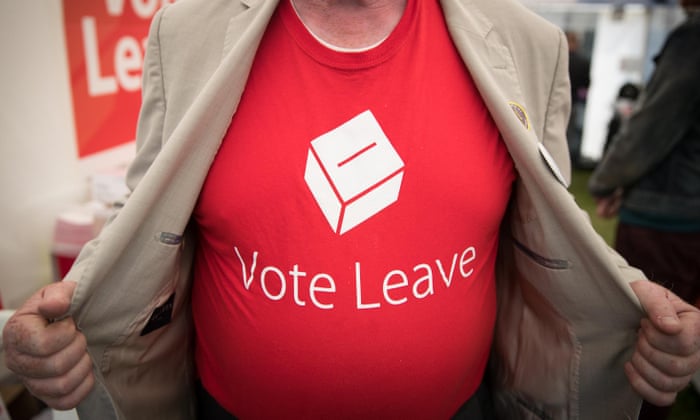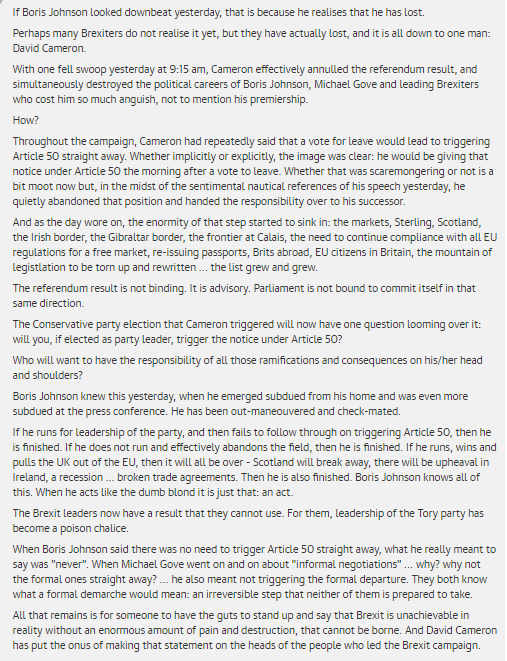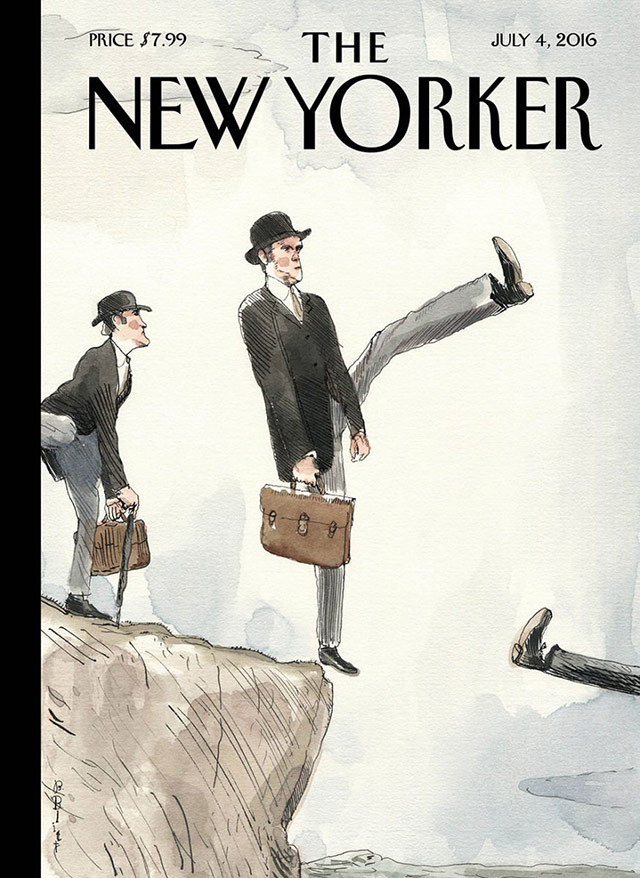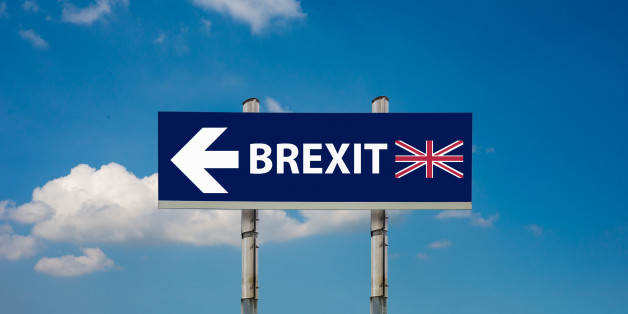Sections
Someone like EU
[avatar user=”malm” size=”small” align=”left” link=”file” /]
“He has put a knife on the things that held us together and we have fallen apart.”
― Chinua Achebe, Things Fall Apart
The week after
It’s hard to know where to start with events in Britain over the tumult of the last week. To begin at the beginning where I left off last time the Leavers had taken control effectively depositing the nation to the start of a new adoption cycle outside of the EU. During the week major Leave figures proceeded to row back from a variety of mid-campaign pledges inviting everything from incredulity to fury right across the spectrum. It was the first clear indication that there was no plot being followed by Leave. Their campaign was never really about the details but about an insatiable itch to throw our collective hat over the fence and then work out how to retrieve it. Evidence for the lightweight construction of the Leave manifesto was always there if you looked hard enough beforehand. For a whole slew of reasons which we’ll look at below, voters chose not to. The dramatic moment when realisation dawned after the event on live TV was electric:
I love @faisalislam’s face during this. He can’t quite believe it. pic.twitter.com/wLvXJn639J
— SimonNRicketts (@SimonNRicketts) June 26, 2016
The sense that voters had been misled or even betrayed by Leave politicians led to wilder speculation as the narrative veered wildly off-piste. Among the more interesting being that Cameron’s snap resignation following his ‘European tragedy‘ had ‘doomed’ Boris Johnson and that Cameron had entered into a immolating death embrace with our own Great White Whale rather like some latter day Captain Ahab. Events later in the week seemed to support that view and underlined the perception that Cameron and Johnson had both merely reprised their boorish Bullingdon club exploits only this time trashing the whole country and leaving others to clean up the mess:
Reasons why
Reporters and analysts generated reams trying to understand why Remain lost. The demographic split led to the assertion that youthful Remain voters had been ‘betrayed’ by their parents and grandparents:
https://twitter.com/MaxCRoser/status/746424800076148736
The polling data used to supply that evidence courtesy of Lord Ashcroft also showed another dynamic namely that:
“Majority of those working full-time or part-time voted to remain in EU; most of those not working voted to leave.”
Immigration was obviously a major factor which was an irony not lost on many observers considering Britain’s colonial past:
"…and in the end, Britain, which had colonized the world, destroyed itself in fantasies that it was being colonized in turn" — historians.
— Ted Scheinman (@Ted_Scheinman) June 24, 2016
With the predictable consequence of emboldening racists who felt that a nation voting Leave instantly legitimated their views and behaviour. A strain of strident populist post-factual anti-intellectualism was another factor. And of course a backlash against globalisation and its capitalist adherents many of whom were pro-Remain and responded with indecent haste to proceedings with the FT reporting some banks had already starting moving certain operations of the UK in the days following the vote. The prospect of those two groups locked in opposition doesn’t appeal:
I don't want a future in which politics is primarily a battle between cosmopolitan finance capitalism and ethno-nationalist backlash.
— Christopher Hayes (@chrislhayes) June 24, 2016
No question, a lot of people are angry and impoverished across the UK as this powerful Guardian commentary written by a man who walked from Liverpool to London makes utterly clear. They drove the Leave vote. This wasn’t always so obvious to observers outside the country but was picked up by John Cassidy in this post in The New Yorker which also explored the reasons why Leave won and concluded that inequality was likely the key factor:
What has certainly happened is that decades of globalization, deregulation, and policy changes that favored the wealthy have left Britain a more unequal place, with vast regional disparities.

The debate serves the show the complex intermarriage of rationales for voting to Leave. The reality is probably somewhere in between – a triangulation of miseries.
Mortality Salience
There is one other darker explanation that comes to mind. But crucially it also has something to do with death and finality. Perhaps Brexit is a manifestation of a lemming-like national death drive?
with everything lying around us, we have the perverse pleasure of seeing the end – a final end of Empire, end of economic security (such as it’s been), end of a particular vision of Britain. Perhaps that’s why there is no plan, no idea of what to do or what Brexit actually means. In seeing our own ‘death’, can we also see our origin? And in seeing this chaotic collection of material yet to become coherent life can we also imagine the life that we, Britain, could possibly become?
This relates to the concept of “mortality salience” or the “awareness by an individual that his or her death is inevitable causing existential anxiety that may be buffered by an individual’s cultural worldview and/or sense of self-esteem”. The combination of mortality salience, democracy and a low-esteem precariat populace makes for an entirely unpredictable cocktail and one I alluded to before in the context of Bilderberg, elites and Thiel. All the more so if one consideres there is evidence to suggest that politicians who are able to successfully channel thoughts of death can be runaway winners. WashPo raised the same concern in the context of Donald Trump. These are clearly dangerous eschatological waters we are swirling in and bring to mind visions past – this one was from the Strange Days of the 1970’s which feels closest to where we find ourselves:
What happens next
Whatever your views on the result it’s an unravelling political earthquake that will have huge ramifications. The New Yorker echoed the views of many when in vividly portraying a vote for Leave as a leap into the dark:
This much-shared New Statesman post pleased “I want my country back” echoing the most well-known Leave soundbite but a week on there is the palpable sense something has irrevocably changed in Britain and there is no turning back. Not least for those who mistook the social media echo chamber for reality. One can but hope they redirect their energies into the physical world:
Let’s hope the fallout from Brexit incites more than the British imagination to craft witty hashtags. The vote has shown that political disaster can happen anywhere.
And in that wider physical world, we are in a serious political mess in the UK which is already having consequences on our global reputation and standing as this absurd attempt to summarise proceedings demonstrated in spades and that was prior to the Gove “knife in the front” move. One wonders if the sense of chaos in the country subliminally affected the England team who crashed out of the football Euros in the same week in a lacklustre and out of sorts performance against Iceland. This post examined the fraught history of English exceptionalism that has persisted in the arena of international football tournaments and what relevance it has to Brexit. It seems unlikely that voting Leave will change fortunes there.
Sticking to tech, the general consensus a week on is that Brexit will be bad. Experience working with numerous multinationals over too many years suggests they will act with their own internal logic and “sense of urgency” to route around Brexit uncertainty like a pilot encountering turbulence. This is going to be a real problem in a modern world that is infinitely more integrated at so many levels than Britain was prior to joining the EEC particularly in the digital domain where physical national borders are today largely nominal boundaries. As one very small example, what happens now in respect of the cross-EU GDPR data privacy regulations? British companies operating digital services will still have to comply with them in order to have a presence in the EU but will have no say on implementation specifics. It’s likely that companies will dial down tech investment in the UK while uncertainty of outcome remains. Startups seem particularly vulnerable and there have been clear indications that Dublin and Berlin in particular will benefit from the fallout from London’s displacement as the centre of action for EU centric startups. Still, what’s bad for tech is going to be good news for lawyers though.
In terms of the Brexit settlement, by now pretty much everyone realises that formal activation of Article 50 is all-important and that until we do so, we are in something of a stalemate situation. One assumes that the next PM will do that very soon after his or her ascent – the longer it is not invoked, the less the chances it ever will be and the more damaging the consequences for UK business. There seem to be two broad options on the table at either ends of a spectrum. It’s hard from here to know where we’re going to end up and when but it seems likely to be somewhere in a spectrum between total isolation from EU single market on the one hand and the Norway model (aka EEA) on the other perhaps by early 2019? The EEA model seems the most straightforward and may even work out ok-ish for UK as it has done for Norway. It would, though, represent a completely unacceptable betrayal to many Leave supporters as it isn’t materially different enough from where we are today in terms of freedom of movement and in some senses worse because we would have zero influence over EU laws that we would still be subject to. ‘Take Back Control’ it is not. It’s becoming clear, however, that the alternative, complete separation, would involve serious distraction and real economic hardship over potentially many years as we find ourselves outside everyone’s tent in an increasingly interconnected digitalized world. It will be a tough call. The negotiation will be critical which is why so many are exasperated by the political vacuum that has developed following the vote. One senses the rest of the EU are clear about that and some on the inside suggest they will be ‘brutal’ with us. This will only get worse the longer we take to get a grip and remain disunited.
A situation like this has been years in the making and it will take years to recover from after we Leave irrespective of the complacent utterances of Leave fantasists who thought it would be simple and we’d be able to dictate terms to other sovereign nations. We’re not that country any more. To think we are is to make a Suez 2.0 scale political miscalculation.
Still, at least at long last we have made a decision as a nation about our ambivalent attitude towards the continent and it does seem that a more politically engaged younger demographic will be one positive outcome.
Reasons to be cheerful
While developments may be seen as sad and bad they’re not quite a bad as this ridiculous scenario whereby Brexit leads to a Trump victory and onwards to World War III. At a time when many are contemplating the horrors of the Somme 100 years on, it’s worth reflecting on the critical need for Britain to work closely with countries and peoples right around the world.
Yes it looks like anarchy in the UK 39 years on but we just have to get on with it and work our way out of the mess. That means accepting the vote and trying to interpret how to implement in terms of a workable roadmap and not lapsing into despair and despondency. Jon Snow echoed that sentiment well. To reuse the motto of the Repair movement:
‘Don’t despair, just repair!’
Besides, even if we mostly end up being poorer, Britain is still as great as it was a couple of weeks ago and there remain many wonderful things about this country. Take Glastonbury for instance which took place over the weekend and was, once again, largely magical. A particular highlight was the sight and sound of 160,000 people singing along to Adele on Someone like You even after she left the stage. I’d suggest this version a suitable anthem for our time with an accompanying rename to “Someone like EU”:
https://www.youtube.com/watch?v=Sof96_BjS0g
Artificial Intelligence
- Benedict Evans on Apple, Google and why the development trajectory of commercial AI is very hard to predict from where we are today – we’re too close to the genesis stage of the adoption cycle with all the pieces that will eventually coalesce to commodity offerings still in flux:
“It seem to me that there are two things that make it hard to talk about the AI explosion. The first is that ‘AI’ is an impossibly broad term that implies we have a new magic hammer that turns every problem into a nail. We don’t – we have a bunch of new tools that solve some, but not all, problems, and the promise of extracting new insight from all sorts of data pools will not always be met. It might be the wrong data, or the wrong insight. The second is that this field is growing and changing very fast, and things that weren’t working now are, and new things are being discussed all the time. So we have excitement and bullshit, skepticism and vision, and a bunch of amazing companies being created. Some of this stuff will be in everything and you won’t even notice it, and some of it will be the next Amazon.”
- Time Magazine explains why Siri will be a foundational piece of the puzzle through sheer ubiquity – Apple’s ultimate aim seems to be to embed it in every product they make providing a universal voice interface for their technology:
It’s an invisible operating system poised to propel Apple, and its products, into the future.

- This useful Medium post outlines how to implement a simple Recurrent Neural Network (RNN) with Long Short Term Memory (LSTM) using Tensorflow from first principles. It’s an architecture which is being used today to support Natural Language Processing (NLP) architectures. I managed to follow along and get the recipe working with the latest version of Tensorflow running on a suitably juiced-up AWS t2.large instance but not without making several changes to the code to reflect changes in the framework since the author wrote his guide. I’ll tidy up the code and release it next week. The process highlighted how rapidly evolving tech like Tensorflow and AWS are lowering the barrier to entry. The same point is made in this excellent introductory piece by Alex Hern, Guardian technology journalist entitled simply “Google says machine learning is the future so I tried it myself“. He too uses a combination of AWS, Tensorflow and NLP together with a training set comprised of Guardian leader editorials. Hern’s main conclusion from his admirable exercise is that the technology is still far from entry-level in terms of accessibility:
“Right now, doing machine learning yourself is like trying to go online by manually coding a TCP/IP stack.”
- One of the keys to making it more accessibility is greater focus on how researchers and users can directly interact with the process of machine learning classification and labelling. The author of this Medium post highlights this concern by pointing to a system he built to support hand gesture recognition:
here’s a video demonstrating a hand gesture recognition system I built that uses Active Learning principles to request labels from the user when it sees a gesture for which it cannot make a clear prediction
- Surprisingly insightful and candid expression of views on the coming wave of technological unemployment from Hillary Clinton in this LinkedIn interview:
“We’re not prepared as a nation and millions of Americans are not prepared with the skills that it will take to really enter into the kind of advanced technological economy that awaits us.”
- Joi Ito covers this same territory in The Future of Work in the Age of Artificial Intelligence.
Mobile and devices
Introducing #AndroidNougat. Thank you, world, for all your sweet name ideas! #AndroidNReveal pic.twitter.com/7lIfDBwyBE
— Android (@Android) June 30, 2016
- The WileyFox Spark is the UK based phone manufacturer’s cheapest Android phone yet at just £89.99 on Amazon:

Leadership
- This FirstRound post on “quantum team management” is intriguing. It suggests that you can become a better manager by simply intervening less – the act of observation interferes with that which is being observed. As this week has shown in spades the real world is fuzzy and maybe we need radically different approaches for how to hold back the chaos.
Being a good manager is not about avoiding failure — it’s about enabling as many different paths forward as possible for as long as possible.


